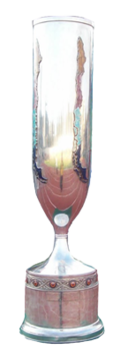This article needs additional citations for verification .(September 2019) |
| Founded | 1958 |
|---|---|
| Region | |
| Teams | 48 |
| Domestic cup | Supercopa de Chile |
| Current champions | Huachipato (1st title) |
| Most championships | Colo-Colo (14 titles) |
| Website | ANFP Copa Chile |
The Copa Chile (Chile Cup) is an annual cup competition for Chilean football teams. Due to time constraints and club pressure, the trophy was cancelled in 2000, but returned in 2008. Its precursor was the Campeonato de Apertura (Opening Championship), played from 1933 to 1950.
Contents
- Trophy
- Finals
- Notes
- Titles by club
- Titles by region
- Other official cup tournaments
- Copa de la República
- Copa Invierno
- Notes and references
- Sources
The cup is now open to every member club of the Chilean football league system, from professional teams; (Primera División, Primera B & Segunda División), down to teams from the ANFA: Tercera División. Since the season 2009, the winners obtained a direct Copa Sudamericana spot for the next season, however this was change starting from the 2015 edition; since then the winners obtains a direct Copa Libertadores spot for the next season.
In the history of the tournament, the Primera División teams have dominated the competition; but, because this is contested in a knockout tournament format, the opportunity for lower-level teams upsetting a top level squad is a real possibility. That was the case in the seasons 1960, 1962, 2009 & 2010, when the winners were clubs from the second level: Deportes La Serena, Luis Cruz, Unión San Felipe and Municipal Iquique. A major upset almost occurred in the 2008 competition, when Deportes Ovalle (from the third level league) became finalist, losing 1–2 to Universidad de Concepción at the final, in a very close match.
In some seasons the tournament only included first level teams, that was the case the seasons: 1979 to 1984, 1986, 1987, 1989-Invierno, 1990, 1998 and 2000.
Only two clubs have become double champions (league and cup winners the same season); Colo-Colo in 1981, 1989, 1990 & 1996, and Universidad de Chile in 2000.
